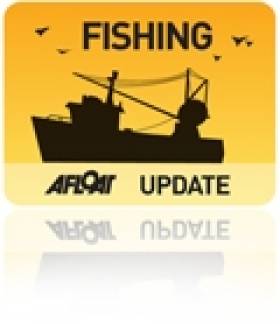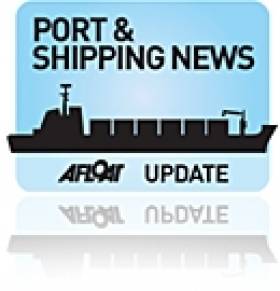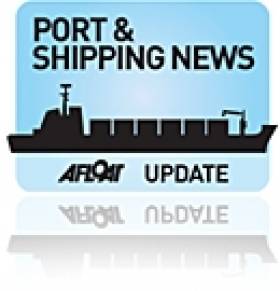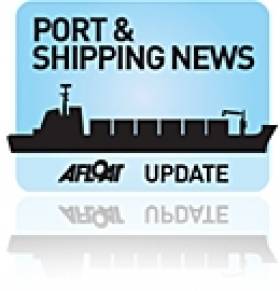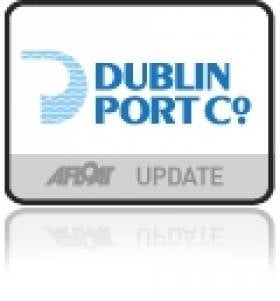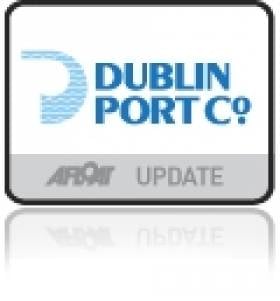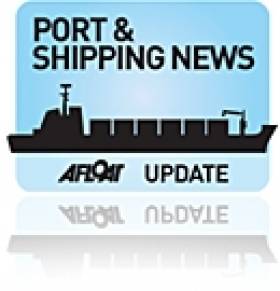Displaying items by tag: IEA
Donegal Based Seafood Company Wins in Seafood Exporter Category
#SEAFOOD AWARD – Sponsors of the Seafood Exporter Award Bord Bia have awarded Donegal based Errigal Seafoods at the Irish Exporter Association's (IEA) Industry Export Awards.
The award recognises companies in the seafood sector that have made significant progress in securing and building export markets for Irish seafood.
Other nominees for this category came from Burren Smokehouse Ltd., Lisdoonvarna, Co. Clare and the Irish Seafood Producers Group located in Connemara, Co. Galway.
Hapag-Lloyd Wins Deep Sea Shipping Award
#SHIPPING AWARD – Hapag-Lloyd was awarded Deep Sea Shipping Company of the Year Award at this year's Irish Exporters Association's Export Industry Awards.
The category was sponsored by the Port of Cork Company which recognises the strategic role that deep sea shipping plays in Ireland's economy. The other nominees were: CMA-CGM Shipping Ireland Ltd., Dublin and MSC Ireland, Dublin.
For information on the other categories and the overall winner of Exporter of the Year Award, click HERE.
Export Industry Awards to Deep and Short Sea Shipping
Eucon Shipping and Transport Ltd won the Short Sea Shipping Company of the Year Award 2011, sponsored by the Irish Maritime Development Office (IMDO), which recognises the strategically important role of short sea shipping to our economy. Eucon offers Irish exporters access to worldwide markets via its regular feeder services to Rotterdam, Antwerp and Southampton operating from the ports of Dublin, Cork and Belfast. The other nominees were: CLdN RoRo S.A. and Grimaldi Lines.
In the category for the Logistics Company of the Year Award 2011, sponsored by Dublin Port Company, the award went to Caffrey International. The Co. Meath based company is a specialist provider of road transport and logistics services between Ireland, the UK and continental Europe.
The award recognises the importance of logistics and supply chain management firms to the exporting effort of companies trading internationally from Ireland. The other nominees were: DHL Global Forwarding (Ireland) Ltd., Dublin; Eucon Shipping and Transport Ltd. and Geodis Ireland Limited, Dublin.
ABC Nutrition of Shannon was presented with the overall award of the Exporter of the Year Award 2011 after winning in the Emerging Markets Exporter Award, one of twelve categories which were presented at the ceremony.
Applications for Short Sea Shipping Company of the Year 2011
Organised by the IEA in conjunction with the IMDO, the competition recognises the outstanding achievements and innovative activity of Short Sea Shipping companies in supporting Irish export industry through efficient import processing as well as export processing services.
The awards search is to culminate with a gala awards ceremony held in the National Convention Centre in Dublin's docklands on 11th November.
Applications forms to enter the category of The Short Sea Shipping Company of the Year 2011 are available on the IEA website; www.irishexporters.ie
Further information about the Export Industry Awards, in addition to information around export supports can also be found on www.irishexporters.ie or email: [email protected]
New €1.5m Rail-Spur for Dublin Port
The minister welcomed "the important investment by Dublin Port Company in its rail network. It will further enhance the attractiveness of the port as a destination for rail-based freight. The project represents a commitment on the part of Dublin Port Company and Iarnród Éireann to customers who want to move goods by rail".
The project took six months to complete and the public private partnership involved Dublin Port Company, Iarnród Éireann and the first customer of the new facility, International Warehousing and Transport (IWT).
IWT is a privately owned Irish logistics company, which already operates freight-trains to Ballina that are expected to increase from 4 to 5 trains per week in each direction as a result of this investment. The rail-operator believes that the service will save up to 5.5million road kilometres annually and reduce CO2 emissions by up to 2,750 tonnes.
The Irish Exporters Association also welcomed the development of the IWT freight operation at the new facility, where increased frequency in services will enhance Ireland's contribution to the European Union's modal shift aspirations from road to rail.
The Common User Terminal is also open to other shipping companies. Existing clients using the lo-lo container terminal operated by Burke Shipping Group through its subsidiary Portroe Stevedores are C2C Lines, APL, Coastal Containers, Evergreen, Gracechurch and OOCL . The terminal also has a ro-ro berth facility where CLdN /Cobelfret operate from on routes to Belgium and The Netherlands.
In addition to the Dublin-Ballina service the port exports 400,000 tonnes of lead and zinc concentrate from the freight customers Boliden/Tara Mines with 15 trains per week. The facility at Alexandra Basin Jetty is regularly served by vessels from Arklow Shipping Ltd, where the 2011 newbuild Arklow Field (2,998 tonnes) is currently berthed.
- Dublin Port
- Dublin Port Company
- Arklow Shipping Ltd
- Irish Exporters Association
- Port of Dublin
- Ports and Shipping News
- IEA
- Minister for Transport
- Ocean Pier
- Irish Rail
- Iarnrod Eireann
- Portroe Stevedores
- Dublin Port news
- IWT
- ASL
- Leo Varadkar T.D.
- Port of Dublin news
- Railfreight
- International Warehousing and Transport
- Alexandra Basin East
- Common User Terminal
- Burke Shipping Group
- Clnd Cobelfret
- Boliden
- Tara Mines
- Arklow Field
- Dublin Shipping
- Lead mines
- Zinc mines
- Irish Railways
- Dublin Port railhead
RMR Shipping Increase Irish-West African Sailings
Dublin Port Company has welcomed RMR Shipping's new increased frequency of its service to West Africa, from a monthly to fortnightly service starting next month, writes Jehan Ashmore.
The direct service which began in 2009 using a single vessel from the capital to Nigeria, Ghana with calls to Lagos and Takoradi, is set to gain a second ship as demand for the service rises.
Two 157-trailer capacity ro-ro sisters are to be deployed on the route, they are the 23,000 gross tonnes sisters Celandine and Celestine. The Belgium-flagged pair both built in 2000 will take 18-days to transit between Dublin and Ghana.
The next sailing to Dublin is due on 5 July when the Celandine (PHOTO) is to dock at berth 51a, which is one of three berths located in the ports multi-user ferryport Terminal 1, shared by Irish Ferries, Stena Line and seasonal services of the Isle of Man Steam Packet Company.
Commenting on the development, Eamonn O'Reilly, Chief Executive Dublin Port Company said: "We are delighted with this development. Anything which increases the link between Ireland and emerging economies beyond Europe has got to be good for exports.
He added, "The service to Takoradi complements our involvement with Irish Aid from 2008 to 2010 in delivering an international training programme for ports in emerging countries including Ghana. The TrainForTrade programme was delivered with UNCTAD and we are hopeful of being able to announce a follow-up to the first programme in the coming months.
The development of RMR Shipping on the direct sea freight link was also welcomed by the Irish Exporters Association (IEA) whose chief executive John Whelan commented that exports to Nigeria last year exceeded €200m, the second largest market for Irish goods into Africa.
Car-Sales Boost Brings Busy Day to Dublin
Normally the Pauline operates on other routes. She along with her sister Yasmine are the largest vessels in the Compagnie Luxemburgeoise de navigation SA (CLnd) / Cobelfret fleet. The vessels are of the Con-Ro design, also known as the 'HumberMax' vessels which have 5,632 lane metres capable of carrying 258 container trailers and 656 cars.
Apart from the Dublin debut of the Pauline which docked at Ocean Pier, the final vessel of the trio, Celestine (1996 / 23,986grt) was the first to arrive from Zeebrugge, docking at the ferryport berth 51A (also used daily by Stena Line vessels). Like the Pauline, the Opaline (2009 / 25,235grt) docked at Ocean Pier and is the newest and last of six newbuilds built from German yard of FGS Flensburg.
CLnD won the Short-Sea Shipping Company Award in 2010 at the Irish Exporter Awards in November and hosted by the Irish Exporter Association (IEA). The award was sponsored by the Irish Maritime Development Office (IMDO) which recognises the strategically important role of short sea shipping to our island economy.
There are four sailings operated by CLnD between Dublin Port and Rotterdam / Zeebrugge. From the Dutch port there are onward sailings linking Göteborg and Esbjerg while the Belgian route connects the UK ports of Killingholme, Purfleet and Ipswich.
The development of the Irish routes are part of the "Motorways of the Sea", an EU-wide programme to promote a modal shift of goods from congested roads to alternative sea transportation. In addition to the concept is the international trend in the use of larger and more efficient vessels.
In October 2009 CLnD /Cobelfret switched their Irish operations from Rosslare to Dublin Port. The transfer to Dublin allowed CLnD to introduce larger tonnage at the then newly upggraded No. 2 ro-ro linkspan at Ocean Pier, Alexandra Basin East.
CLdN ro-ro SA and CLdN ro-ro UK offer ro-ro connections from Belgium and the Netherlands to the UK, Ireland, Sweden and Denmark. Both divisions share a combined core fleet of 20 vessels. Some ships including the Pauline are registered and flagged from land-locked Luxembourg. The fleet operate on short sea ro-ro trade routes, occasionally supplemented by time chartered tonnage, which accommodate trailers, containers, vehicles and other rolling equipment.
IEA Export Industry Awards to Shipping
In the category of Short Sea Shipping Company of the Year, sponsored by the Irish Maritime Development Office, which recognises the strategically important role of short sea shipping to our economy, the winner of the award was CLDN Colbefret Group.
The Belgium operator opened two new routes from Dublin to Rotterdam and Zeebrugge in November last year, providing a range of transport options to Irish exporters selling to Europe. Since then Cobelfret have gradually introduced new Con-Ro (Containers and Roll-On/Roll-Off) vessels onto the continental routes. The six 25,000 gross tonnes newbuilds were built by FGS Flensburg, Germany and the latest unit Opaline, is due to make a Dublin debut tomorrow.
Cobelfret's operations in Dublin are based in Alexandra Basin East using the ports No. 2 ro-ro linkspan berth. A previous linkspan built in the 1950's was demolished last summer to develop a larger linkspan, to cater for larger tonnage like the Opaline. The new vessel has 2,907 lane metres for freight vehicles spread over three decks and a container capacity for 854 TEU mafi-trailers.
Donegal based Marine Harvest won the Seafood Export Award, sponsored by Bord Biá. The company is an indigenous fully-integrated salmon breeding, farming and processing operation, exporting premium products to Europe and North America.
The overall winner of the IEA's Export Industry Award for 2010 was the Irish Dairy Board.




























